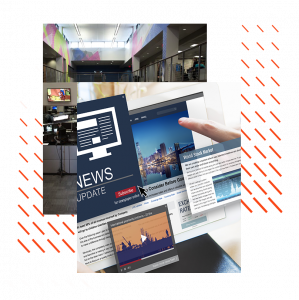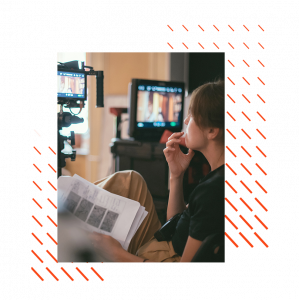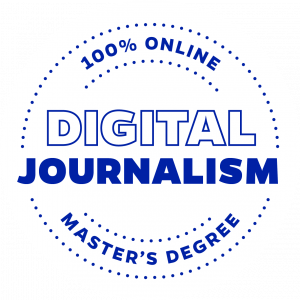Digital Media and Multimedia Storytelling Concentration


Modern Tools.
Timeless Principles.

Combine innovation and integrity to Become a Journalist People Can Trust
Ethical journalism has never been more important. In a world overwhelmed by misinformation, modern journalists must combine technology with truth, offering people reporting they can trust.
The University of Florida online MA in Mass Communication with a concentration in Digital Journalism and Multimedia Storytelling produces graduates who are masters of the latest reporting, writing, and technical skills for traditional journalism, digital media, and storytelling across multimedia platforms.

Request More Information
Submit the form below to learn more about admissions, curriculum and financial aid.
Request More Information
Submit the form below to learn more about admissions, curriculum and financial aid.
Why Earn a Master’s in Digital Journalism and Multimedia Storytelling at UF CJC?
The online MA in Mass Communication with a concentration in Digital Journalism and Multimedia Storytelling is designed for working and aspiring journalists. The program challenges you to think critically, independently, and creatively when creating and evaluating both your own work and that of others. You’ll learn to:

- Provide editing, evaluation, coaching and helpful feedback to improve writing for publishing.
- Relate theories of mass communication to current topics in digital journalism and storytelling.
- Create engaging narratives for digital audiences across multimedia platforms, including emerging formats.
- Use data analysis and interpretation in creation of news stories and audience engagement.
- Apply the principles of free speech and a free press.
- Master the latest reporting, interviewing, storytelling, writing, editing, and technical skills for journalism, digital and social media.
- Practice professional ethics and collaboration in the pursuit of truth, accuracy and fairness.
- Learn to navigate a changing industry as consumers increasingly seek alternative online sources for information.
- Understand the best practices for combatting the growing amount of misinformation, particularly online.
- Analyze historical and current information to identify key events, trends and potential stories.
Key Program Features
The online Master’s in Digital Journalism and Multimedia Storytelling prepares you to investigate, report and connect with audiences using the latest digital tools. Key features of the program include:
100% online
Allowing professionals to continue working while earning their degree
37 credit hours
for a master’s degree.
Fall, spring and
summer program starts
No GRE/GMAT
requirement
Excellent value
Master’s program starts around $18,000
Access to the University of Florida's strong alumni network
Principles of Journalism
This course covers the history, ethics, legal issues, economics, and modern challenges of journalism. Students gain knowledge and engage in discussions about the role of journalism in a democracy, the threats to modern journalism, the function of a free press, and the elements/characteristics of strong and compelling journalism. This course will provide a contextual overview for the journalistic work that students will produce.
Reporting and Writing for Digital, Audio and Video
This course combines traditional reporting skills with the multimedia skills required of journalists today, including writing, audio, video, photo, data visualizations, and more. Students learn to pitch ideas, produce content, and market ideas to various media platforms. The course emphasizes community-based reporting with a strong focus on producing content/stories for specific audiences.
Multimedia Editing
This course covers the many levels of the editing/coaching process that happens when producing journalistic work, ranging from high-level critical thinking to editing with precision. The editing techniques covered will focus on writing, audio, video, and photos, so that the editing tools can be applied to multiple forms of journalism, from short-form social media to longer-form narratives and a variety of genres in between. The course emphasizes tools that are used to help journalists produce compelling content relevant to specific audiences.
Social Media for Journalists
This course covers the relationship between journalists and audiences, which has changed from a one-way broadcast model to a two-way method of communication. As journalists need to have a respect for and an understanding of the people journalism is designed to cover, this course will look at how a collaborative culture is changing journalism and how journalists operate in this world. The course will cover social-media strategy and tools, audience engagement, reporting through social media, and more.
Data Storytelling and Visualization
This course will introduce students to the fundamentals of effective data-driven storytelling and communications. The students will learn how to detect and articulate the stories behind data sets and communicate data findings in visual, oral, and written contexts for various audiences. The students will gain an understanding of Tableau, a data visualization tool.
Research Methods in Mass Communication
This course teaches students the methods and strategies to use when evaluating online communication tools. Through effective working knowledge and real-world applications, students analyze and apply various types of research methods and tools.
Mass Communication Theory
This course introduces students to the study of mass media theories, specifically focusing on theories that can be used as the foundation for effective communication strategies in traditional and new media. Students assess how to bridge these theories to practice in mass communication industries. Students also gain an understanding of the theoretical perspectives that direct mass media research and apply them to their own final project, which requires them to develop strategies to solve problems or capitalize on opportunities within the communication industries.
The Online Digital Journalism and Multimedia Storytelling Degree Curriculum
A curriculum guided by an Advisory Board of top industry experts, ensuring the program remains cutting-edge and relevant. All students in the Digital Journalism and Multimedia Storytelling program take seven core courses.

What You’ll Learn
As a student in the Master’s in Digital Journalism and Multimedia Storytelling program, you’ll grow as a communicator through hands-on assignments and detailed, constructive feedback from peers and instructors.
Career Outlook
The U.S. Bureau of Labor Statistics projects about 4,500 job openings per year for journalists over the next decade to replace those retiring or leaving the profession. Specific positions you may qualify for upon graduation include:
- Multimedia Journalist
- Content Writer
- News Producer
- Editor
- Copywriter
- Market Research Analyst
- Digital Strategist
- Data Journalist
- Audience Engagement Editor
- Social Media News Producer
Take The Next Step in Your Journalism Career
The online Master of Art in Mass Communication with a concentration in Digital Journalism and Multimedia Storytelling equips you with the skills to thrive in a complex, changing media environment. You’ll learn to create impactful, multimedia-rich stories, analyze data, engage digital audiences, and uphold the ethical standards that build public trust. It’s a program designed for journalists who want to advance in a newsroom and professionals ready to pivot into the media profession.
Submit the form below to learn more about admissions, curriculum and financial aid.
Submit the form below to learn more about admissions, curriculum and financial aid.
